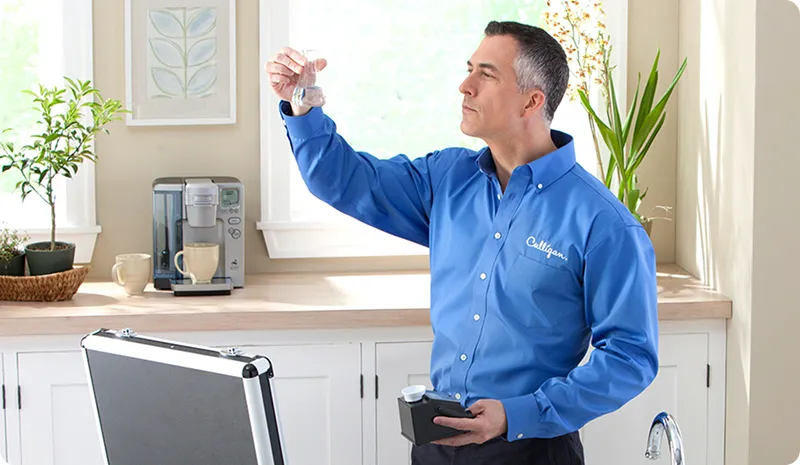Blog
Why Is My Hair So Dry?
Published: January 31, 2026

“Why is my hair dry?” It’s a common question with a loaded answer. There are several causes for dry hair:
- Repeated use of heat styling tools without a heat-protectant spray
- Environment: cold, dry air or UV exposure
- Hard water at home
- Washing hair too often
- Using oil-stripping treatments like perms, dyes, and relaxers
Getting to the bottom of your hair problems can benefit more than just your appearance. Dry hair causes dandruff, itchy scalp, and hair loss. Learn about why your locks might feel brittle and how to prevent dry hair.
Heat Styling Tools:
If your hair is dry, you might want to put down your heat styling tools. Curlers, straighteners, and high-heat blow dryers can dramatically damage hair by destroying the hair’s cuticles. In just ten repeated uses, heat styling tools can cause hair to change color, become rough, and dry out. To help protect your hair from heat damage, allow your hair to air dry. If you’re in a time crunch, be sure to blow dry your hair before using styling tools. While reaching straight for the curler might save you time, it will cause even more significant damage to your hair. You can also apply a heat-protectant spray to dried hair for extra safety. These sprays can provide thermal protection to your hair by building a layer upon the hair’s cuticle. This can help prevent the breakdown of the hair’s natural proteins (also called tryptophan) which make your hair feel strong and smooth. For the best results, cut heat styling tools out entirely.
Weather
Weather isn’t doing your hair any favors. For those who live in cold, dry environments, your hair may be in serious trouble. Dry air lifts the hair cuticle which releases moisture and causes breakage and frizz. That said, those in warm climates are also at risk of too much UV exposure from the sun. This can cause hair to become just as dry and brittle. That said, there’s no need to spend every day indoors. Take care of your hair by hydrating it with oils and products that restore moisture at the root.
Hard Water
You’ve likely spent time considering the shampoo and conditioner you use – but, what about your water? Hard water is a neglected culprit of dry hair. It damages hair by causing a buildup of magnesium and calcium minerals on the scalp. Researchers have even found that just washing your hair for ten minutes a day can build a layer of scum resulting in dryer, duller hair. To combat dryness, think about investing in a water softener like Culligan’s Water Softening System. Not only can you achieve smoother, fuller hair, but you can use 50% less soap to wash your locks.
Washing Your Hair Too Often
When you use shampoo to clean your hair, it strips away visible debris and excess grease. But, shampoo can also strip your hair of natural oils, which provide moisture and shine. There is such thing as washing your hair too often. Unless your hair is naturally greasy, you should only wash it once a week – especially for those with dry hair. That said, the frequency with which you wash your hair may differ depending on your gender, race, and environment. Unsure how much time you should leave in between washes? Use the next few weeks to gradually decrease your number of weekly washes until you reach the perfect medium.
Oil-Stripping Treatments
Like with shampoos, oil-stripping treatments like perms, dyes, and relaxers can remove the natural oils from hair. Hair dye is the most notorious for its drying effects. Most commercial dyes use peroxide to desaturate your hair’s natural color. This ingredient causes dyed hair to become dry and straw-like. While these treatments might make hair look better, they may not help it feel better. Permanent treatments combined with dyes can lead to the most extreme cases of hair damage including breakage at the scalp. To keep your hair feeling soft and shiny, avoid chemical treatments when possible.
Dry hair treatments shouldn’t require expensive procedures or products. If you’re looking to restore your hair’s natural shine and volume, first get to the root of the problem. Soften your water, reduce your weekly washes, and avoid hair treatments.





